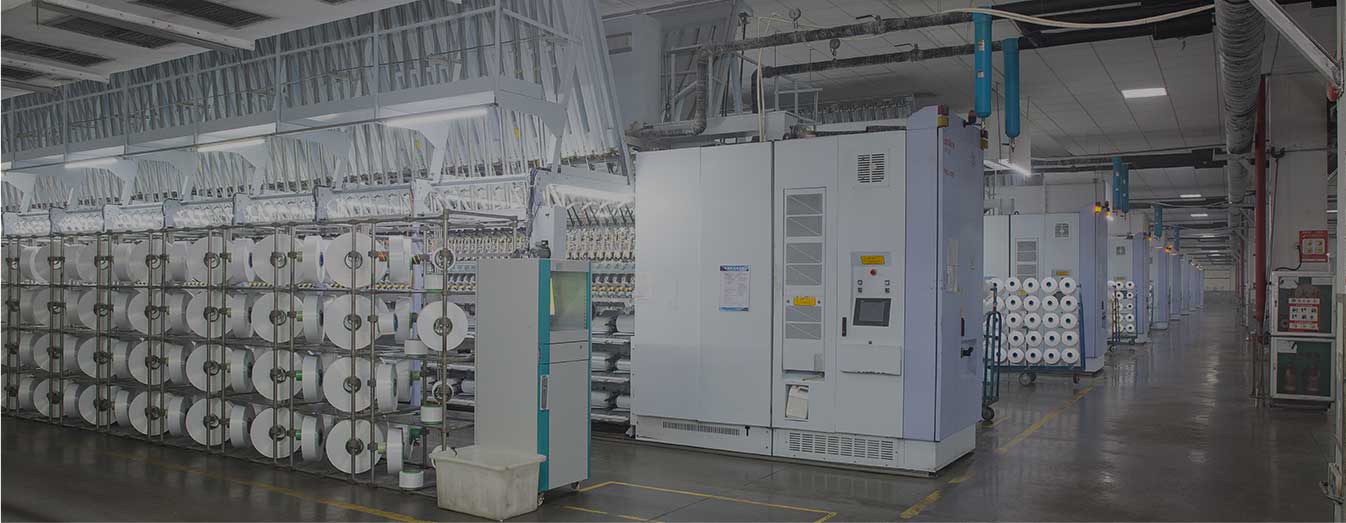-

Home Textiles
-

Garment Industry
-

Automotive Interior
-

Window Decoration Fabric

Ring Spun
Ring spun is a mature and widely used mechanical textile method on the market and is commonly used in the production of various types of short fibers. Century Chenxing mainly produces rayon yarn, including pure viscose yarn, blends of polyester and viscose, blends of polyester and acrylic, and blends of acrylic and viscose in different proportions. It can stably produce ring-spun yarns from 20S to 60S.
We use international advanced equipment, such as India's Longview spinning machine and Japan's Murata fully automatic winding machine, and we adopt industry-leading patented technology and advanced processes. Therefore, the yarn we produce has the advantages of smoothness, even dryness, less hairiness, high strength, and a soft hand feel. It is widely used in the manufacturing of various types of knitwear and woven products, such as T-shirts, shirts, jeans, bedding, etc.
This product accepts customization. For details, please click the button below to contact us. Our sales staff will reply to you within 24 hours during working hours.
| Color | Raw White | |
| Transport Package | Carton | |
| Net Weight/Carton | 25KG | |
| Production Capacity | 20000 tons/year | |
| Regular Specifications | ||
| Viscose | 21S 25S 30S 32S 40S 50S | |
| Polyester+Viscose | 20/80 | 21S 25S 30S 32S 40S |
| 35/65 | 21S 25S 30S 32S 40S | |
| 65/35 | 21S 25S 30S 32S 40S | |
| 70/30 | 21S 25S 30S 32S 40S | |
| 80/20 | 21S 25S 30S 32S 40S | |
| 90/10 | 21S 25S 30S 32S 40S | |
| Polyester+Arcylic | 80/20 | 30S 32S |
| Acrylic+Viscose | 60/40 | 30S 32S |
| 50/50 | 30S 32S | |
- det1
- det3
- cleaning
- drawing
- roving
- spinning
- winding
- inspection
- video
- det123
| Color | Raw White | |
| Transport Package | Carton | |
| Net Weight/Carton | 25KG | |
| Production Capacity | 20000 tons/year | |
| Regular Specifications | ||
| Viscose | 21S 25S 30S 32S 40S 50S | |
| Polyester+Viscose | 20/80 | 21S 25S 30S 32S 40S |
| 35/65 | 21S 25S 30S 32S 40S | |
| 65/35 | 21S 25S 30S 32S 40S | |
| 70/30 | 21S 25S 30S 32S 40S | |
| 80/20 | 21S 25S 30S 32S 40S | |
| 90/10 | 21S 25S 30S 32S 40S | |
| Polyester+Arcylic | 80/20 | 30S 32S |
| Acrylic+Viscose | 60/40 | 30S 32S |
| 50/50 | 30S 32S | |
-

Home Textiles
-

Garment Industry
-

Automotive Interior
-

Window Decoration Fabric
/shijichenxing/2023/11/14/rand/7691/viscose-spun.mp4












Zhejiang Century ChenXing Fiber Technology Co., Ltd.
Century ChenXing Weaves A Better Life.


Zhejiang Century ChenXing Fiber Technology Co., Ltd., founded in 2017, with a land area of 340 acres and more than 1,000 employees, is an enterprise engaged in the production and trade of nylon spinning yarn, nylon draw texturing yarn, spandex covered yarns and various spun yarns. The company has established a provincial high-tech enterprise research and development center, and has acquired GRS and other industries required certifications.
The company's production equipment mainly includes TMT spinning and winding machine, Barmag texturing machine, Langwei spinning machine, Murata pallet winder,etc.. With an annual output of 60,000 tons of nylon6 POY, 30,000 tons of nylon6 DTY, 20,000 tons of nylon6 FDY, 40,000 tons of spandex covered yarns, and more than 20,000 tons of various spun yarns, the total production capacity has reached 170,000 tons. The product quality is stable, the production capacity is increasing year by year, and a brand effect has been formed.
The company insists on the purpose of “Innovation promotes development and integrity builds brand”, and sticks to the enterprise spirit of “Adhere to pragmatism, strive for excellence and innovation, unite and dedicate”. Through the continuous technical transformation of equipment, with more environmentally friendly technology, the professional team has built a more mature and complete manufacturing system. In application of advanced automated production equipment, and an efficient integrated mode of production and quality control, the company can always meet customers' expectations of product quality and delivery efficiency, and has become a reliable and well-known supplier in the industry.
The company always with a magnanimous mind cooperates with friends from all walks of life sincerely, and creates a better tomorrow hand in hand!
News
-
How Ring Spun Yarn Enhances Durability and Comfort in Textile Products
In the world of textile manufacturing, the type of...---24 Mar
READ MORE -
Exploring the Impact of Ring Spun Yarn Properties on Fabric Manufacturing
When it comes to fabric manufacturing, the type of...---21 Mar
READ MORE -
Innovation promotes development, integrity builds brand, the exhibition tour of Century ChenXing 2025 International Yarn Exhibition has come to a successful conclusion
March 13, a three-day 2025 China International Te...---17 Mar
READ MORE -
Revolutionizing Textiles: The Siro Compact Spun Advantage in Modern Spinning
In the ever-evolving textile industry, innovation ...---12 Mar
READ MORE -
[Festive Blessings] To every shining "her power": between the longitude and latitude, flexible bloom
The spring breeze in March blows in the beautiful...---07 Mar
READ MORE


 English
English 中文简体
中文简体 Español
Español عربى
عربى











































